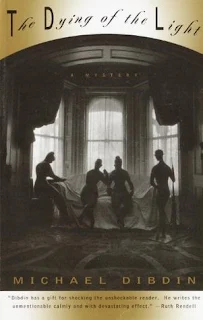 |
I'm not sure that I
perhaps |
I first read this book
when I was at university in the 90s, and although it was not long after
publication, I had to buy a second-hand copy as the original was already out of
print. I’ve a feeling it was recommended to me by a friend whose opinion on literature
I respected, but whose peccadillos included property damage, practical jokes,
and catastrophic combinations of the two: we were once left trapped inside our
hall of residence as he’d removed the front door handle. In another amusing
jape he and a friend sealed shut my bedroom door with adhesive mastic whilst I
slept, only for someone to leave the hob gas on – they were terrified (and
probably highly amused) I might have died of asphyxiation as I was drunk and
unresponsive to their banging and yelling.
Anyway, it may have been
in the context of our undergraduate degree module choices that the
recommendation was made as I’m confident that Agatha Christie’s The Murder of Roger Ackroyd was on the
syllabus somewhere, as was The Mermaids
Singing by Val McDermid, so I’m assuming it was something to do with female
crime writers. This would make sense as this friend was a nascent sexist –
perhaps only for laughs, but then many a truth was told in jest – as were all
young men in the 90s, and he would have loved pointing out a male writer who
was doing the same only better to annoy our lovely seminar tutor and post-grad student
tutor Kath.
So, and in a roundabout
way, back to the book. Comparing any fictional detective novel to Agatha
Christie is a bit of a low bar for a reviewer (one which many detective novels
fail to clear nonetheless) but this does bear comparison for its smart little
twist of which no more later for risk of spoilers, and Dibdin does enjoy a detective
pastiche (see The Last Sherlock Holmes
Story for a very accomplished and entertaining example).
The setting is Eventide, a
home for the aging and hopeless, where the neglect of its residents is only surpassed
by the abuse of its residents at the hands of the brother and sister owners. In
this setting, in between doses of medication, Rosemary and Dorothy fantasise that
they are chronicling a murder mystery, inventing personae and backstories to
enliven the tired, lonely lives of fellow residents. In reality, there are some
strange goings on, but nothing that can’t be explained away by the borderline
psychotic care-home management – residents not taking their prescribed medicines,
delusions and dementia etc. Only Dorothy, Hastings to Rosemary’s Poirot (or….
Dolly? Cherry? to Rosemary’s Marple?), goes and gets herself murdered on the
eve of her emancipation (albeit to a palliative care ward for her terminal
cancer), and now Rosemary must put into practice her years of finely-honed if
imagined investigative skills.
For fans of Dibdin’s Aurelio
Zen novels, this will be a surprise – a little light on plot, a thriller disguised
as cosy-crime – but it still manages to carry across the intense paranoia with
which Zen’s Italian landscapes seem replete. It’s sharp, funny and clever, even
if the detective charged with actually investigating the murder is some sort of
day-time-TV-drama pastiche himself, and despite this it still has a darkness at
its heart. A perfect balance.
(Paid link)
Comments
Post a Comment